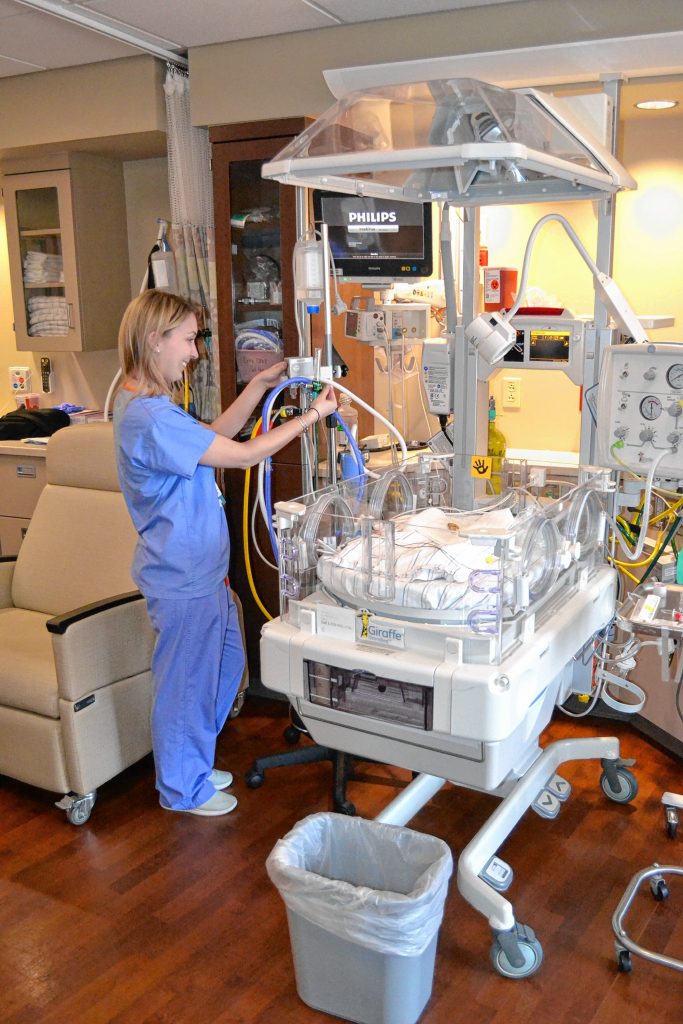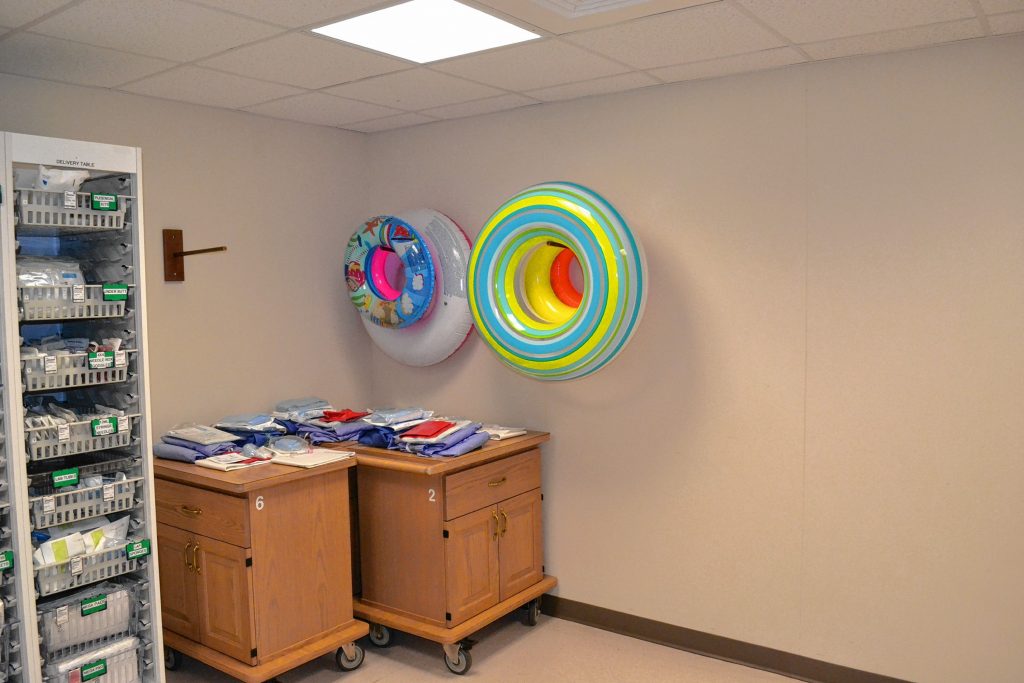If you ever go to The Family Place at Concord Hospital to either have a baby or visit someone who just did, every so often you’ll hear this chime sound throughout the fourth floor.
That’s what happens when the hospital’s birthing unit welcomes another life into the world.
On average, The Family Place sees almost four babies born in a 24-hour cycle with that totaling in the neighborhood of around 1,250 births per year.
“Some days we have none, some days we have seven or eight,” said Family Place Director Erin Collins.
In this line of work, that’s just how it goes – you never really know what’s going to happen from one hour to the next. An expecting mom can come in on her due date, three weeks early or 10 days late.
But that’s also why Collins and The Family Place staff are ready for anything because at any given moment there could be babies ready to be born or expecting moms walking through the door in the midst of labor.
“This type of work has so many variables,” Collins said. “You kind of learn to be ready for any and all.”
As of April 1, the unit now has 24-hour a day, seven days a week in-house coverage through the obstetrician hospitalist program. There are about 20 OB providers who make up the coverage from practices within the hospital structure and around the community. They usually work in 24-hour shifts, so there’s been a real sense of continuity and reduced the need for on-call requests for coverage. But that can still happen – just depends if there’s a full unit or not.
When it comes to the nursing side of things, at any given time there are eight to nine for every shift with more available through the on-call schedule should the need arise. (See full moon and pregnancy.)
And with a unit that consists of 20 private rooms (10 of which are deluxe and all feature jacuzzi tubs and showers), a three-bay acute care area and three continuing care rooms, there never seems to be a dull moment.
When a soon-to-be mom walks through the door, they are brought into the three-bed triage unit. That’s where the staff establishes a quick baseline by checking out mom and baby. It’s where they decide if mom needs to be checked in to have the baby.
“We have to evaluate each family as it comes,” Collins said. “So that’s usually where most families start.”
If that’s the case, a family will be placed in one of the 20 rooms, which are called LDRP Room. That stands for labor, delivery, recovery, postpartum. Assuming all goes well and to plan (if there is such thing when it comes to having a baby), the mom will both labor and deliver in that room. It’s where she will recover (along with her partner) and begin the journey of parenthood with the new baby.
“This really is a family centered approach where you do everything in the same room,” Collins said. “So you can enter into that family moment together.”
Since the nurses are on 12-hour shifts, each new stay is given a devoted labor nurse for that personal feel to the experience. If scheduling allows (as well as some other factors), you can even request the same nurse when they come back on.
“For the most part, you get that one to one person,” Collins said. “It’s important that we’re in tune with our patients.”
Now with 20 rooms you might assume that’s plenty of space, but there actually was one instance where it was a full house and a baby came in the triage. And there’s plenty of stories about babies born on the way to the hospital. Expect the unexpected.
There’s a dedicated spot for cesareans (C-sections) on the floor and another space used in the operating room. But even if you’ve had a C-section before, you can still try for a natural birth the next time around.
“Our organization supports that birth approach,” Collins said. “We have a really high success rate and it’s great to offer the family that option.”
As a Level B birthing unit, The Family Place can handle twin births – three or more must go to Dartmouth or Boston – and babies born at 32 weeks or greater.
“We’ve even birthed families that are 32 weeks and less and then determine where they need to go next,” Collins said.
The standard stay time is two days for natural birth and three for cesareans, but for those like multiples or premature, there is the option for longer stays thanks to the six-bed special care nursery, the acute care unit and three continuing care rooms. Sometimes mom is ready to go home, but baby needs to stay for more time, so this allows for mom and baby to continue being together.
“Our philosophy is to keep mom and baby together at all possible,” Collins said. “Until the baby is ready to go home.”
And if for some reason a discharged baby needs to come back, The Family Place is connected to the pediatric unit.
For those babies born into a substance abuse situation, a number that has grown at the hospital from 2 to 7 percent from 2014 to 2017, the minimum stay is 96 hours.
It’s all one big oval, secured with locked doors, so they always know who’s going in and out.
“Security is a very important thing for us,” Collins said.
The lactation services are housed in the unit, as well as the postpartum emotional support coordinator, both of which are available for up to a year after birth.
And even if you’ve decided to go the midwife route, The Family Place is more than welcoming to your wishes and plans – even if they change during the course of labor and delivery.
Tours are available, which are mostly done during the third trimester of pregnancy. Visiting hours are 3 to 8 p.m., and children visitors are limited to siblings.
But don’t worry about all the little details, because when you go in to have a baby, The Family Place staff will make sure they’re all taken care of.
“This is a really special moment for that family,” Collins said.











December 2, 2019
I am interested in becoming a volunteer in the cuddles program. How do I apply for the program?